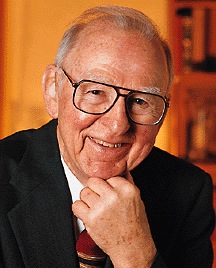Edwin Krebs
| Edwin Gerhard Krebs | |
|---|---|

Edwin Gerhard Krebs
|
|
| Born |
June 6, 1918 Lansing, Iowa |
| Died | December 21, 2009 (aged 91) Seattle, Washington |
| Nationality | United States |
| Fields | biochemistry |
| Institutions |
University of Washington, Seattle University of California, Davis |
| Alma mater |
University of Illinois at Urbana-Champaign (B.S.), Washington University in St. Louis (M.D.) |
| Notable awards |
Louisa Gross Horwitz Prize (1989) Nobel Prize in Physiology or Medicine (1992) |
Edwin Gerhard Krebs (June 6, 1918 – December 21, 2009) was an American biochemist. He received the Albert Lasker Award for Basic Medical Research and the Louisa Gross Horwitz Prize of Columbia University in 1989 together with Alfred Gilman and, together with his collaborator Edmond H. Fischer, was awarded the Nobel Prize in Physiology or Medicine in 1992 for describing how reversible phosphorylation works as a switch to activate proteins and regulate various cellular processes.
Edwin Krebs is not to be confused with Hans Adolf Krebs (1900–1981), who was also a Nobel Prize–winning biochemist and who discovered the citric acid cycle, which is also known as the Krebs cycle.
Krebs was born in Lansing, Iowa, the third child of William Carl Krebs, a Presbyterian minister and Louise Helen (Stegeman) Krebs. The family moved frequently due to the nature of his father's work, though they settled in Greenville, Illinois when Krebs was six and remained there until his father's unexpected death in 1933. Louise Krebs decided to move her family to Urbana, Illinois, where Krebs's elder brothers were attending the University of Illinois at Urbana-Champaign. Krebs attended Urbana High School, and enrolled at the University of Illinois at Urbana-Champaign in 1936. In his fourth year of study Krebs had decided to either pursue a higher degree in organic chemistry or study medicine. Receiving a scholarship to attend Washington University School of Medicine in St. Louis, he chose the latter.
...
Wikipedia
